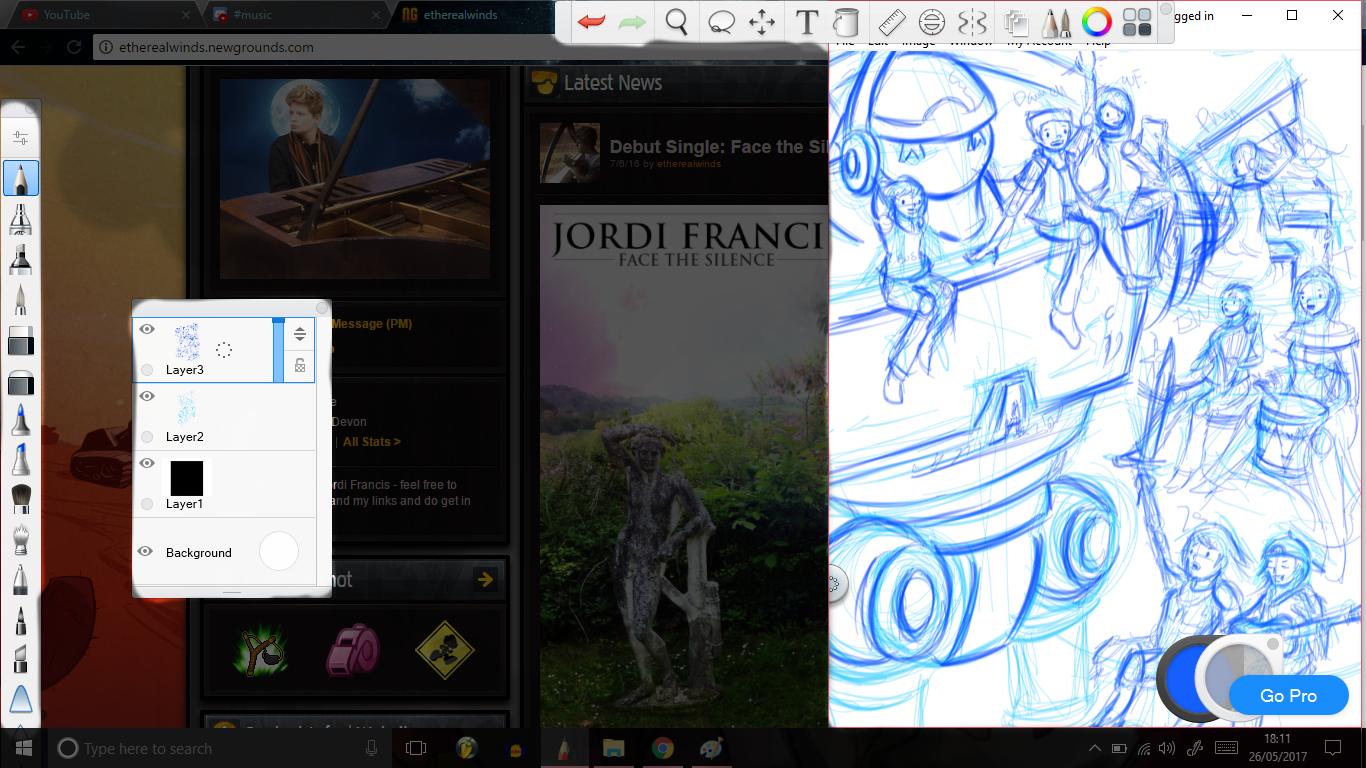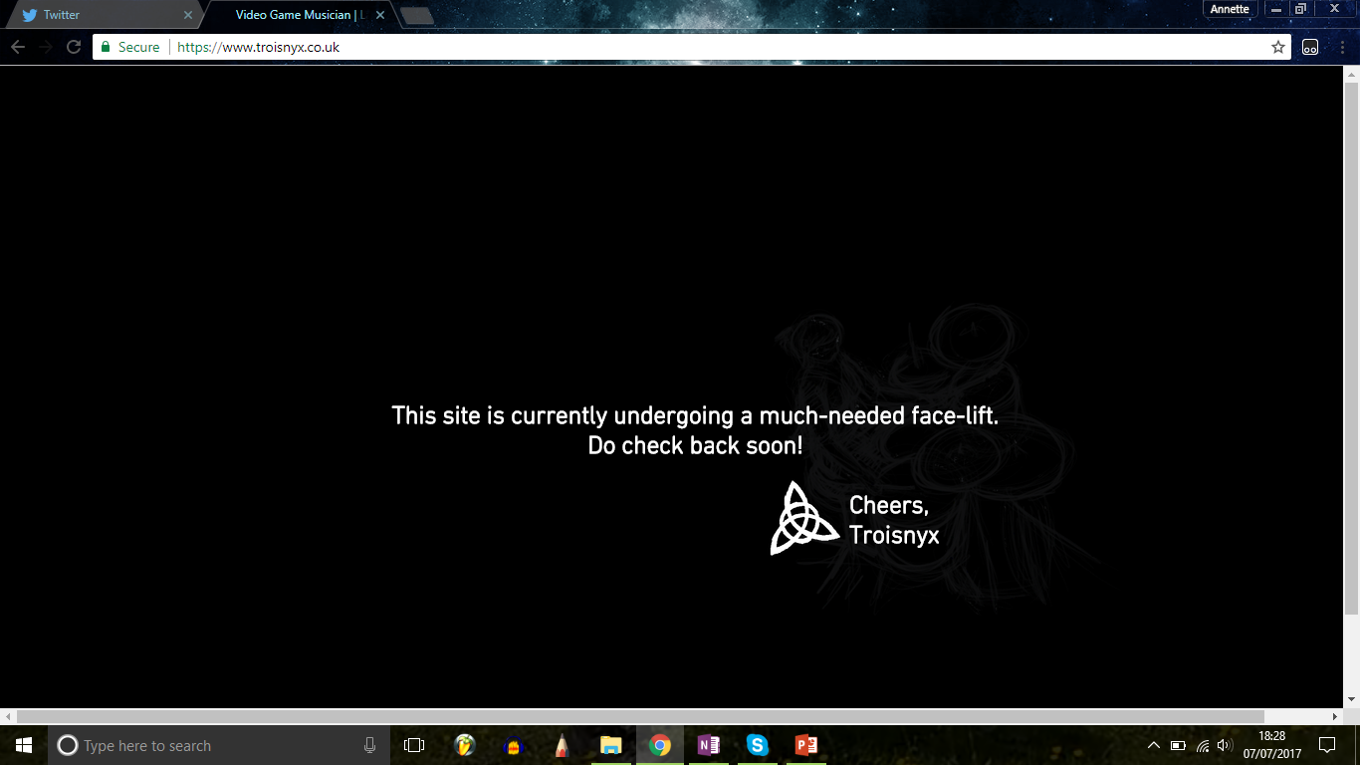
Ooooo, what could the end result be, ooooooohh?
Composer, percussionist, artist, self-backing choir.
½ of Two Meeps
¼ of Those Fucking Snowflakes
For commission or session work inquiries, DM me here, or HMU on Discord, or at mail@troisnyx.co.uk
Age 34, she/they
Choir Director
Lancashire, UK
Joined on 6/26/11
Posted by Troisnyx - July 1st, 2017
Three days after it was originally meant to be uploaded, after several human and technological fucking hissy fits, here is Part Two of The Making Of: Mio/Homura, below.
The video features my fiancé Seán, who is recording most of the footage, and friends Daryll, Ashley and Louise from Soundskills, where I offer my musical services on some days. It is Louise who applies most of the facepaint on me. I remember mentioning in the last post that I wondered if the makeup was a bit OTT (over the top), but that's a question for another day.
With that, I have an announcement to make. Weather permitting, we have a date set for the recording of the music video: 20 July 2017!
With it being the start of July, we have two weeks and a bit to gear up for that. There are still a few loose ends to be tied up and such. I'm going to need to rehearse my dance for the video, too. Gonna build up even more endurance as well, in the meantime. To the friends who are part of the Mio/Homura crew: let's make it work! To the rest -- hope you enjoy what you see, and I'll come back with more news after 20 July.
Posted by Troisnyx - June 27th, 2017
In the evening tomorrow, will be editing and uploading the Mio/Homura makeup test video, and giving a filming date for the actual music video which should hopefully be stuck to, weather permitting. Here, have an image, from the inside of Soundskills, taken yesterday.
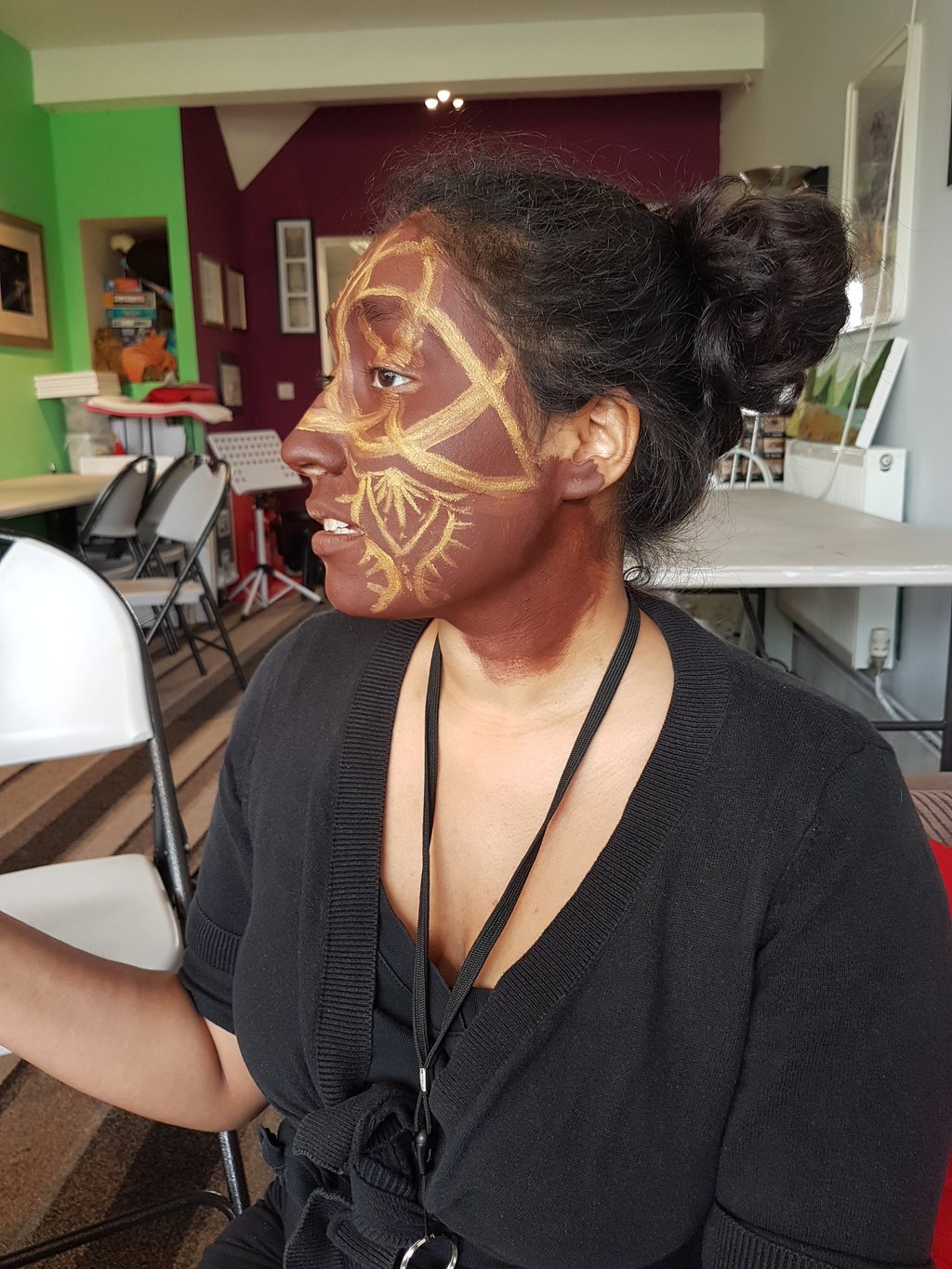
The facepaint was partly applied by me, but mostly applied by a friend of mine. And this, of course, was based on this previous picture that I had used on my profile at one point:
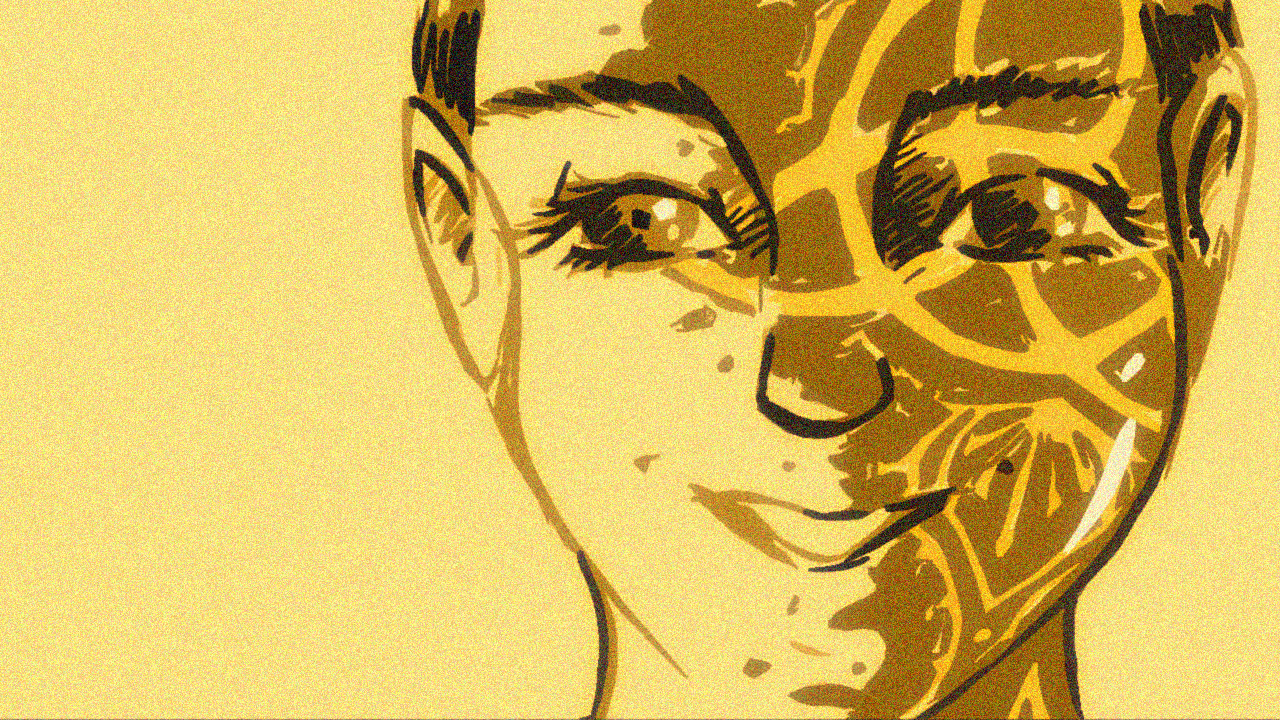
So as you can see, the makeup above needs quite a bit of fine-tuning. But it's looking... alright, I guess. There are still questions that play in my head like, does this need just a single colour? Is brown/gold a decent combination or will some people get different ideas? With a white dress and a flower crown is this thing even going to work?
At any rate, it's leaving me quite excited. I have something very big and beautiful to look forward to.
Posted by Troisnyx - June 25th, 2017
Tomorrow afternoon, if all goes well, will be my makeup test for the Mio/Homura music video. Yes, we had to reschedule it. If it does happen on the day, then I can finally say that we are moving forward at last. Wonder how long a production like tihs needs to take when it's a community / collaborative project that doesn't involve everyone being in the same company, or whatevs.
I am working on a cover, a Kingdom Hearts cover, called O City That Was Not. Those of you who are wondering what piece of music it's based on, it's this one.
Some of you may have heard previews on Instaudio by this point; regardless: I have finished sequencing the notes, but not tempo and volume envelopes. Considering I don't know the permissions for this, from what I've heard, the safest bet is for it to go on YouTube with some nice visuals. The idea is that I disable revenue on that video -- and the revenue should automatically go to the people who made it or the people who have permissions, in this case, Yoko Shimomura.
@Phyrnna and @EDM364 have offered to help with the lyrics video, and I am very much looking forward to seeing what's ahead. Speaking of which, EDM, I'm waiting to see your meepy effects! ^_^ Anyway:
Considering that I don't know of the permissions about this song, this is going to be a YouTube-exclusive cover. I'm not risking putting it up on Newgrounds unless, say, it's an animation and we're all getting zero revenue from it, but even then I still don't know how it works, admittedly.
The Home Office has allowed me to perform music publicly while sticking to the condition that I do not accept payment (given my situation). Even that is a sliver of liberty for me, to be able to go out and make a name for myself.
If you are in Preston or nearby, expect to see me at the various pubs accompanying a ragtag bunch of friends, singing, and possibly playing any instrument that I take in my hands (mainly drums). See what happens!
Lastly, I want to draw your attention to this playlist: COMPILATION/Troisnyx Remixed. It's a playlist which, as you can imagine, has remixes of my stuff from other users here on NG. It's slowly expanding, of course.
Lately, I've released the stems of one of my short loops, Can You See the Clouds Divide, into the public domain. I'd written a thread about this but at this point, I'm not bothered to source it; what I mentioned there and what I'm mentioning here is exactly the same. If you feel that you'd like to do something with it, you can download the stems here. I'd love to see what you make of it!
So naturally, that playlist is going to have more remixes of that song than of any other. But if you want to remix anything of mine, kindly ask me and if I have the stems, I will pass them along to you. (Some of them may have been permanently lost with the failure of triplicate backups that I'd tried to make some years back.)
On the note of COMPILATION/Troisnyx Remixed, I'd once suggested that if the indie game associated with a certain track of mine ever gets completed, I'd hold a remix contest. The song in question is Nightfall, and the game is still in development hell. So obviously, no contest is going to be held, until further notice.
But if people ask me, if I were to theoretically hold such a contest, what rewards I would give? The only thing I can think of, along the lines of the various game-related art contests on NG, would be Steam keys, a full copy of the OST and Supporter. I'm not sure if there's anything to include in a prize bundle beyond that, but I suppose time will tell. I've had no contact from Arpeggio Games lately, which indicates to me that they really are struggling. Oi @Hoeloe, you still around?
Posted by Troisnyx - June 22nd, 2017
Several years later...
No, but in all seriousness, I don't know what came into me yesterday. Whereas previously the pain of holding down the strings deterred me because my skin doesn't soften, yesterday afternoon was different. I wanted a guitar to experiment with over at Soundskills, and one of my friends, also one of the permanent volunteers there, gave me one to play around with. And I practised a set of chords all afternoon. I'm still practising it today. And for the first time ever, I was willing to work through the pain.
What got into me?
But the result is staggering. It feels like I've played for a while. :O
The plus side now is that I can not only write songs with the guitar eventually if I keep at this -- I'll be finally able to 1) write parts for guitar, and 2) actually realistically sequence one, even if I'll soon not have the need for it if I'm going to be plugging in a guitar to record for songs. But it'll take me a while. I'm able to play some chords in G major, and I've started by rehearsing only a section of one of my songs, one which you all haven't heard yet.
It feels so surreal. But now, I no longer have the excuse of "being able to play everything but brasses, reeds and guitar." I now can only reduce this to brasses and reeds.
Posted by Troisnyx - June 17th, 2017
To begin, I had a slight spot of annoyance because the actual charger that came with my PC is now completely knackered. My meepy Seán managed to salvage a cable for me, from (presumably) an older Acer computer, and it seems to be working fine apart from some power fluctuations. It is.... mmmh.... okay for now.
Talking about computers brings me to video editing, a subject to be touched upon heavily with the upcoming music video for Mio/Homura... if it is upcoming at this rate. It has been a month and two days since the track got released. Since then, I've managed to get the dress and shoes, a little bit of the leatherwork, and we managed to scout the area for the recording, and that's about it. We haven't had a makeup test yet because things always fucking get in the way, you know what they're like, and we haven't had particularly good weather either. So that's where it's currently at. Watch this space.
Posted by Troisnyx - June 4th, 2017
It's been a thankless ride, one with little to no support and one with no breakthroughs whatsoever. Fuck this shit.
Level 99, Final Form Sora was my last hurrah, and I think it should stay the way it is.
Posted by Troisnyx - May 31st, 2017
So, today, we officially began prep for the Mio/Homura music video. Those of you who haven't already heard the track, kindly click here.
My fiancé Seán and I went walking through some woods that he was very familiar with. Having grown up around Fulwood, he knew the area around Midgery and Fernyhalgh quite well. There are some woods there, and a brook, and some open meadows. All the ingredients which we felt necessary to express the sentiments behind Mio/Homura in visuals!
So we took some footage of our exploration, some nine minutes and a bit of meep. We explored, imagined footage, and I beat my drum a bit.
It was just beautiful, being with him, and preparing to bring another massive creative project to birth.
Part 2 should be on Monday; I'm going to be meeting a couple friends at Soundskills to test that facepaint idea, the one that is my profile picture on Newgrounds, the face with the henna-like designs. Seán's gonna be there to observe and record what he can. It's kinda ironic that in spite of him having a neurological condition which causes him to shake, his camera footage was a lot steadier than mine. I suck at cameras. XD
I intend to have the flowers in my hair on the actual recording day, but we'll see what happens. Like with everything else that I've been doing so far, video is going to be nonprofit.
Posted by Troisnyx - May 27th, 2017
Don't be fucking snobs.
I've heard people making threads and things like these where they bitch about animators not wanting to work for free, like this, which is completely justified given the amount of time, effort etc. goes into animation.
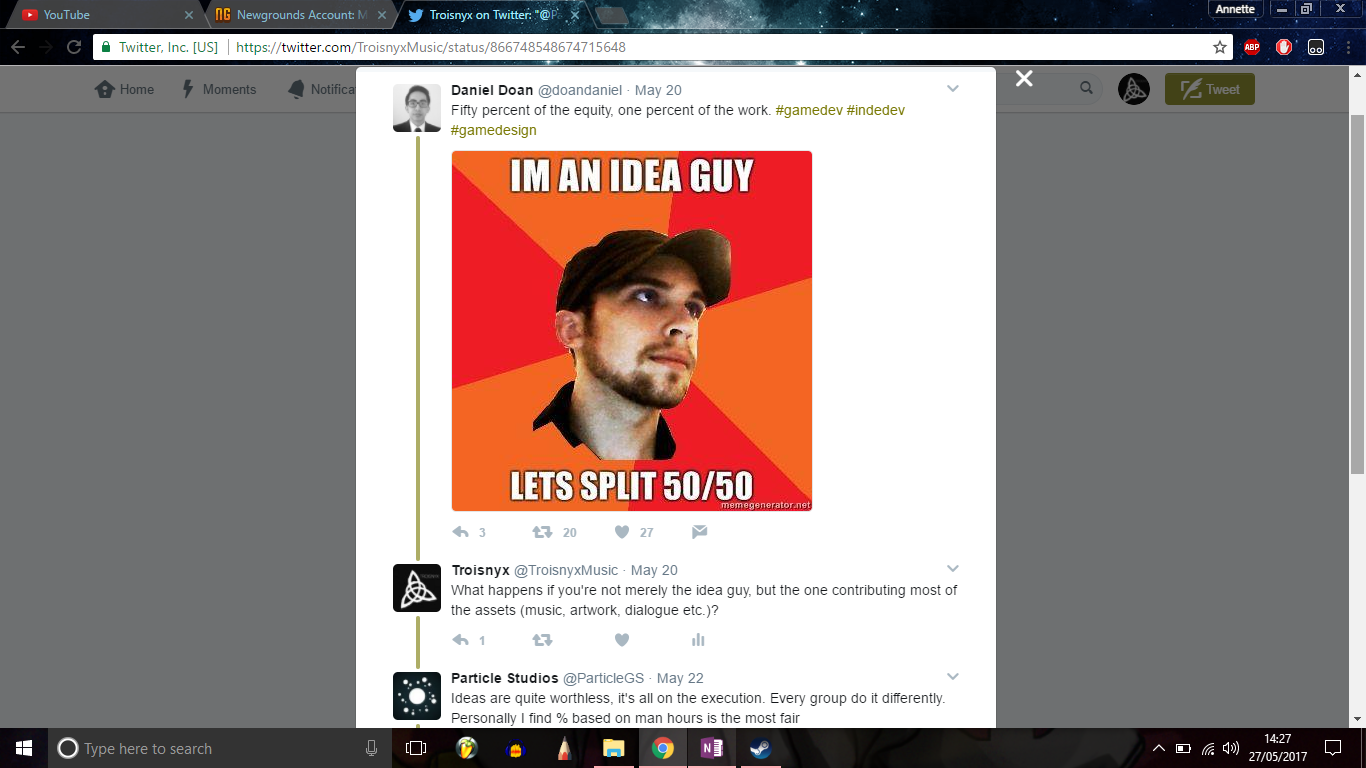
Trouble is, you fuckers never account for when idea guys are far more than idea guys, giving you precious music, artwork, VA and writing for this sort of thing. I have had people say to me that they're not willing to pay diddly squat to anyone who comes up with ALL THESE OTHER THINGS, just because they're animators and therefore have to get all the profit because otherwise nothing justifies working with an animator. I have had this experience multiple times over the five-plus years that I have been on Newgrounds.
Yes, because if you're a musician, or a visual artist approaching an animator to work together for any reason (read: NOT MERELY AN IDEA GUY), your craft will still be considered as diddly squat by animators. Fact. I've been through this many times before and I cannot begin to tell you how heartbreaking it is.
When @matt-likes-swords released Epic Battle Fantasy 3 and was on the way to releasing EBF4, there were a number of us who sat together and did a massive collaboration, a tribute to what started on NG and grew into a really accomplished series of games in our eyes. Guess what: the musicians and the artists were all game for it. The animators? "Oh give us fucking money." I remember even collecting together an entire playlist of songs from the failed EBF collaboration, all of which never got used. Many of the songs have since been deleted, which meant I could only find five out of all the songs that had been submitted. Yeah, nice of you lot to piss on people's hard work there.
Um, I've got news for you: musicians, artists, voice actors and writers deserve their fair wages as well. If they're coming to work with you, they too are hoping to earn something as much as you are. Cut them some fucking slack. Just because you spend the longest time on your craft, doesn't make our craft any less worthy of payment, recognition or acknowledgment than yours. We spend our time actually working our arses off just as much as you do.
In fact, we say the same things to other people as well, we roast those who want completely free gigs unless they really cannot provide for one reason or another, but sometimes artistic camaraderie takes over. Not always, but sometimes. This never happens with animators unless it's something huge like the NG 20th Anniversary Collab. In all my experience across the Art, Audio, Writing and Animation forums, I've noticed that those doing art, audio and writing are more willing to accept people's sincerity on face value. Animation, however? Money, money, money, all the fucking time. Most animators I've come across have assumed that everyone has worked out the logistics of crowdfunding, the making of Patreons, or even just the means of working out record labels when even those people are struggling. I know animators need to put food on the table, but so do the rest of us, mate.
Don't get me wrong; you're justified in asking that, because it is, after all, the most time-consuming craft. Oh wait, actually, the same could be said for music, duh! Lots of effort and lots of patience goes into one minute, never mind thirty seconds of the bloody stuff. I hear people on the Audio forum complaining every so often that musicians etc. are treated like shit all of the time; in my mind, the biggest example of this is when you're trying to just do something fun with someone creative for any reason whatsoever, only for them to treat your craft as mere nothing and ask you to pay up just because you're somehow dealing with a bigger fish, HOW and WHY exactly?!
So, to ask for moolah, and to never be relenting to those who are sincere in offering their own talent to actually boost yours?
You know what? Just to protest, I'd be happy to actually get more musicians, artists etc. to REJECT your bid for making artwork, finding music, getting writers, if you should ever come across those forums again. Perhaps some of us should even say "oh, you animators are just nothing more than idea guys." Maybe that'll make you feel what it's like to be in our shoes for once.
Animators and programmers get the brunt of the attention on Newgrounds because well, their media is far more visual, and a darn sight more interactive than musicians and other visual artists. But if you aren't musicians and visual artists yourselves, you wouldn't get far without musicians and visual artists. So if they come up to work with you, and they're struggling, don't fucking dismiss them. You'll only alienate them.
I mean, for my part, apart from something I really have love for, I don't contribute to games and animation. If my craft is going to be pooh-poohed on by some supposedly bigger fish, then what's the fucking point?
Posted by Troisnyx - May 26th, 2017
To begin, I have reached 600 fans. Actually, a bit more, but meeeeep!
I really want to thank all of you who have followed me, and who still are. You guys are awesome. I never imagined getting this much support at all. Just...... thank you.
The timing couldn't be better, too. Some two Mondays ago, I released what I believe to be my best piece yet -- namely, Mio/Homura EXTEND ver. I would embed the Newgrounds player onto this post ordinarily, but it's having embed issues. So, for this post, content yourselves with the link and the Soundcloud embed below.
In previous posts I'd gone over the context of the piece, mentioning the demons I was trying to exorcise with the making of Mio/Homura... I am pleased to say that all the resentment I felt prior to the release of this piece of music is now gone. It all just melted away. ^_^ I am in bliss over this piece.
I am still reeling from the excitement that I felt over this when I released this. I think I'll get back to producing new songs when I am ready. Part of the excitement doesn't yet die down because there's still the music video for Mio/Homura to be recorded, and we're getting bits together. We've found the clothes and shoes to be used, we've found makeup artists who are trying on that facepaint idea of mine as I speak, we've found the location to film this. There still needs to be leatherwork done on my drum strap and beaters, for comfort and historical accuracy. So, that's a thing. Watch this space.
So, for those of you who are interested in the music I make, I've set up a Discord chat. If you'd like to join it, feel free to access it here.
I will try to access it once a week, say, Saturday evening unless things arise on any particular Saturday evening. Anyway, let me know in the comments section below if you consider joining, and I'll be sure to keep people informed to the best of my ability.
20 May marked three years since Seán and I got engaged. I am just so grateful that he is in my life. He's supported me an awful lot, and I've come a decent way in healing the mental and psychological scars, in large part, thanks to him. I love him. <3
In fact, you see I spoke of Mio/Homura above: he was the one who persuaded me and begged me to remake it. I was determined to just give it up altogether, but he pleaded with me. "Don't abandon it, please," I kept hearing him say.
We celebrated that anniversary in simplicity, really. We went to town, had lunch at the Harris Museum, and just generally appreciated each other's company and meepy meep. We don't like extravagance all that much, so it did us fine. The most important thing that day is that we had each other.
It may not seem like much, but I've started work on what I hope will be an NG skin, commemorating the Audio Portal and its artists.
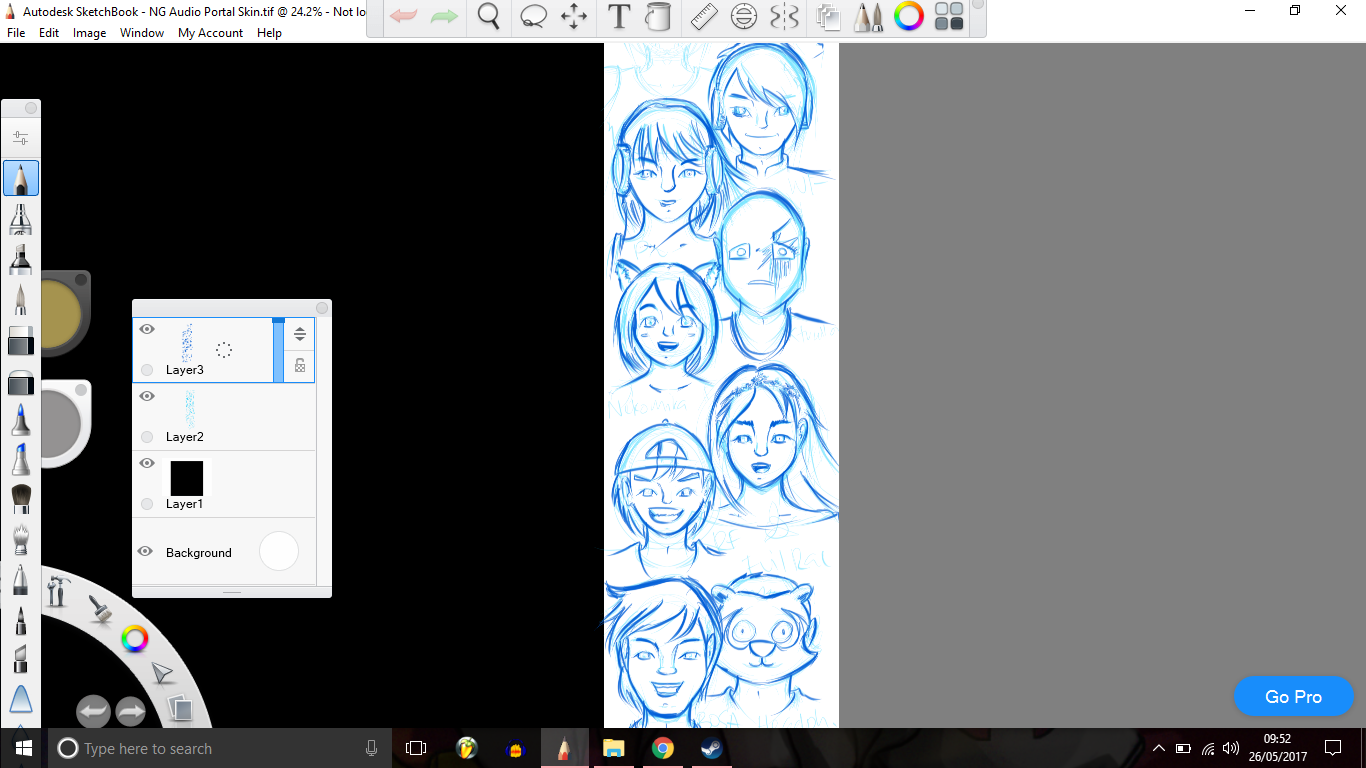
So far, I have @ZStriefel (not in shot), @hania (not in shot), @Waterflame, @Phyrnna, @Xtrullor, @NekoMika, myself, @RealFaction, @EvilRaccoon and @Bosa. This is evidently not enough; I'd like more representation of the Audio Portal and the avatars musicians use. So, if anyone would like to come forward with information about current and past NG musicians' visual representations, please do so in the comments section below. I would really appreciate that. And granted, it'll take me a while, but the more people the better, because I'd like to put forth to everyone the immense diversity of the Audio Portal.
I think the only person I can think of whose actual face I can use is @etherealwinds, but I haven't drawn him yet. Not sure if he wants me to use another image though. Meep.
EDIT: New design.
